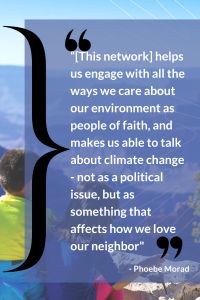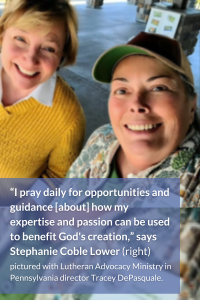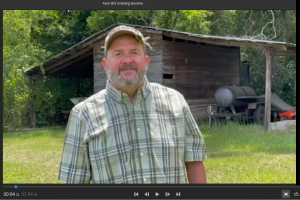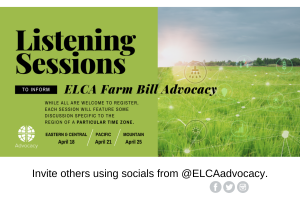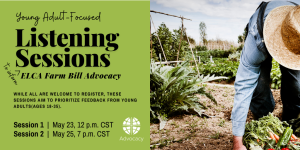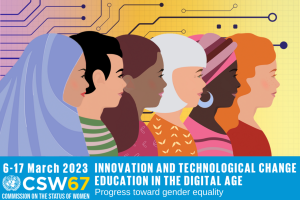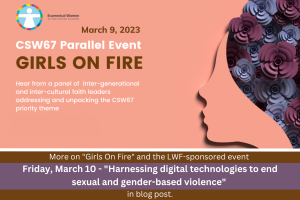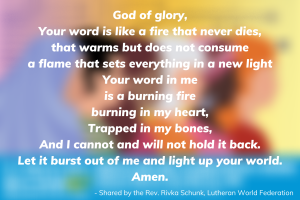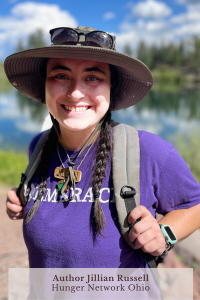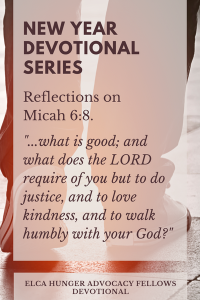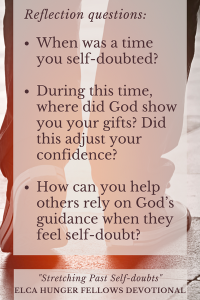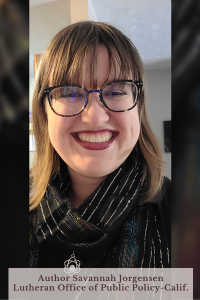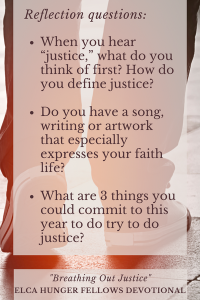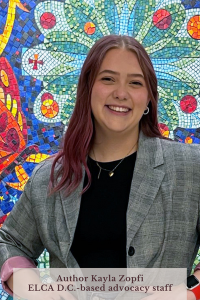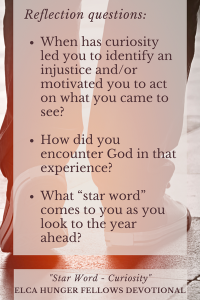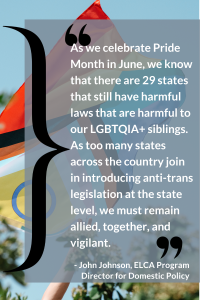 The last few years have seen record numbers of anti-LGBTQ bills being proposed and passed, particularly in state legislatures, across the country. “As bishop of this church, I am concerned that the rights of transgender and nonbinary Americans have been targeted all over this nation,” wrote ELCA Presiding Bishop Elizabeth Eaton in her statement on anti-transgender legislation (3/20/23). “We must stand together, dear church, faithfully advocating for the full humanity and dignity of all people. Let us recognize and affirm the humanity of our transgender and nonbinary siblings. Let us advocate for their dignity.”
The last few years have seen record numbers of anti-LGBTQ bills being proposed and passed, particularly in state legislatures, across the country. “As bishop of this church, I am concerned that the rights of transgender and nonbinary Americans have been targeted all over this nation,” wrote ELCA Presiding Bishop Elizabeth Eaton in her statement on anti-transgender legislation (3/20/23). “We must stand together, dear church, faithfully advocating for the full humanity and dignity of all people. Let us recognize and affirm the humanity of our transgender and nonbinary siblings. Let us advocate for their dignity.”
With a family-informed plea, Jamie Bruesehoff, a member of the ELCA Church Council, wrote: “Our transgender siblings are crying out for justice, they are begging for mercy and protection, for support, for people to care with their words and their actions. Our rostered leaders, our seminarians, families with transgender youth, and the transgender people in our pews need the church to show up at this moment” [written for their blog and reprinted in the ELCA Advocacy Blog (4/3/23)].
A confession in ELCA social teaching serves as caution as we confront the current policy trend. “Christian churches have rarely been in the forefront to gain civil rights for people who are lesbian, gay, bi-sexual, transgendered or queer,” reads the ELCA social message “Human Rights” (p. 7). Yet many in this church have cried and heard the cries and been stirred to action.
SHOWING UP AND SPEAKING OUT
Showing up and speaking out in support of transgender siblings include several ELCA bishops, ELCA-affiliated state public policy offices, and lay and rostered congregational leaders from many parts of the United States.
Synod Sampling
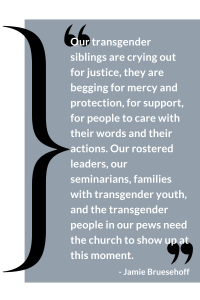 As Missouri grapples with reportedly the most anti-LGBTQ bills filed of any state, more than 300 faith leaders throughout Missouri including Bishop Susan Candea of the ELCA Central States Synod and many rostered ministers of that synod added their signatures to an open letter to state lawmakers to oppose bills targeting the LGBTQ community. “Many of the bill sponsors cite their faith as a reason for their support of such legislation,” the letter (March 28, 2023) available from The Episcopal Diocese of Missouri states. “We disagree. These bills do not uphold the shared principles of mutual respect, undeniable dignity, or abiding love found in the tenets of our faiths. The signers of this statement, while representing a diversity of faiths and perspectives, are united by our opposition to further legal restrictions aimed at LGBTQIA+ people that dishonors their belovedness and worth.”
As Missouri grapples with reportedly the most anti-LGBTQ bills filed of any state, more than 300 faith leaders throughout Missouri including Bishop Susan Candea of the ELCA Central States Synod and many rostered ministers of that synod added their signatures to an open letter to state lawmakers to oppose bills targeting the LGBTQ community. “Many of the bill sponsors cite their faith as a reason for their support of such legislation,” the letter (March 28, 2023) available from The Episcopal Diocese of Missouri states. “We disagree. These bills do not uphold the shared principles of mutual respect, undeniable dignity, or abiding love found in the tenets of our faiths. The signers of this statement, while representing a diversity of faiths and perspectives, are united by our opposition to further legal restrictions aimed at LGBTQIA+ people that dishonors their belovedness and worth.”
In a March 17, 2023, statement shared with the ELCA Central States Synod, Bishop Candea wrote, “This is not a social issue. These are the lives of people we know… We are all diminished by the lines we draw between ‘us’ and ‘them.’”
Also acting in coalition, Bishop Tessa Moon Leiseth of the ELCA Eastern North Dakota Synod and Bishop Craig A. Schweitzer of the Western North Dakota Synod signed on with others from the ELCA as well as other denominations to a published letter (March 10, 2023) calling for the state legislature to “oppose bills that would harm the people of North Dakota and support legislation that reflects the true values of North Dakotans, values that guide us to care for one another and build a state that welcomes everyone.”
Earlier in the year, Bishop Amy Current of the ELCA Southeastern Iowa Synod included raising attention to anti-LGBTQ legislation among items in the legislative session that aligned with Lent. “A recent study shows 44% of LGBTQ youth in Iowa considered suicide in the last year compared to 18% of non-LGBTQ youth,” she wrote to the synod (Feb. 27, 2023), noting several bills had been introduced in this legislative session that put LGBTQ adults and children at risk, including through curbing access to education, privacy, accommodations and healthcare. “Jesus commanded us to love our neighbors as ourselves,” Bishop Current wrote, “These neighbors, LGBTQ children, adults, and their families are our neighbors and deserve to live with dignity and respect.”
An op-ed column coauthored by Bishop Sue Briner, ELCA Southwestern Texas Synod, and Bishop Suffragan Kathryn M. Ryan, The Episcopal Diocese of Texas, was published (March 30, 2023) in the state which has seen may anti-LGBTQ bills in the 2023 legislative session. “It is plain to see by the many anti-trans and anti-LGBTQ+ bills filed in the Texas Legislature and across the country that trans individuals are not being seen to bear the image of Christ, are not having their dignity respected, and are not being seen as an opportunity through which the rest of us, in striving for justice and peace, might honor the image of God,” they wrote. “We faithfully hold the position that God calls us to meet the needs of transgender individuals and to empower them to flourish through the means of care which medical and therapeutic professionals continue to hold up as the gold standard. We stand with our transgender siblings and their parents and doctors, opposing interference with their access to medical and psychological care because it violates the human dignity we seek to uphold.”
Bishop Michael Rinehart of the ELCA Gulf Coast Synod participated in a prayer vigil (March 27, 2023) to support LGBTQ Texans testifying against a number of anti-trans bills in the state’s House.
From the ELCA Nebraska Synod, Bishop Scott Alan Johnson co-authored with Bishop J. Scott Barker of The Episcopal Diocese of Nebraska a piece in the Omaha News-Herald titled “Midlands Voices: Legislation like LB 574 and LB 575 violates human dignity” (4/2/23 updated 5/9/23).* “These bills dishonor those who are doing their utmost to discover how they bear the image of God within themselves and in relationship to the people they love,” they write.
ELCA-Affiliated State Public Policy Office Sampling
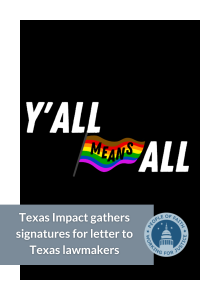 ELCA-affiliated state public policy offices (sppos) have galvanized significant advocacy to promote dignity and respect under legislative threat.
ELCA-affiliated state public policy offices (sppos) have galvanized significant advocacy to promote dignity and respect under legislative threat.
- Discrimination is not a Texas Value is the headline accompanying a letter to Texas lawmakers (May 2023) organized through Texas Impact in the sppo network. “We wish to bring lesbian, gay, bisexual, transgender, and queer (LGBTQ+) Texans to your attention, as they remain at great risk. They are the target of routine mistreatment ranging from unkindness to life-ending assault, and they are forced to navigate unjust policies and practices on a daily basis. Alarmist language, fear-based rhetoric, and general mis or disinformation fuels discrimination, and discrimination does great harm.” The letter, signed by many including Lutheran congregations and individuals, continues, “As legislation is developed, filed, and negotiated, we urge you to use the authority afforded you by your office to unequivocally reject the targeting of marginalized people, and to both protect and do good for vulnerable Texans.”
- Kansas Interfaith Action, a sppo, has been attentive to developments in the Kansas legislature. “We spent quite a bit of time and effort recruiting and preparing testimony on several bills targeting trans people in Kansas,” wrote Rabbi Moti Rieber, executive director (February 2023).
- The Columbus Dispatch published a Letter to the Editor (Dec. 2022) by ELCA Deacon Nick Bates, director of Hunger Network in Ohio. “Sadly, there are lawmakers in Ohio that want to ban the right of kids to play as their authentic selves. I am discouraged by legislative proposals such as House Bill 151 that deny our trans and non-binary youth the opportunity to play sports,” he wrote. “House Bill 151 replaces love with bureaucracy, it replaces compassion with big government. We should welcome these children, because God already has.”
ALL OF US
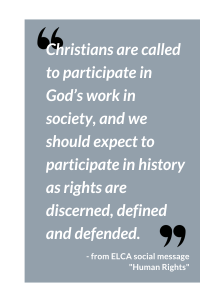 There is some encouragement to hear voices of Christians confronting this struggle, but our advocacy remains vital. “As we celebrate Pride Month in June, we know that there are 29 states that still have harmful laws that are harmful to our LGBTQIA+ siblings,” says John Johnson, ELCA Program Director for Domestic Policy. “As too many states across the country join in introducing anti-trans legislation at the state level, we must remain allied, together, and vigilant.”
There is some encouragement to hear voices of Christians confronting this struggle, but our advocacy remains vital. “As we celebrate Pride Month in June, we know that there are 29 states that still have harmful laws that are harmful to our LGBTQIA+ siblings,” says John Johnson, ELCA Program Director for Domestic Policy. “As too many states across the country join in introducing anti-trans legislation at the state level, we must remain allied, together, and vigilant.”
The ELCA social message “Human Rights” articulates a summons for God’s people in the ELCA to renewed attention and courage, discernment and action to promote and protect human rights. It says, “Christians are called to participate in God’s work in society, and we should expect to participate in history as rights are discerned, defined and defended” (p. 11).
In your communities and states, your advocacy is important. Reach out to your sppo or synod staff or task force for support and collaboration. Federally, our ELCA Witness in Society advocacy staff are monitoring for opportunities for federal policy action. The 🗺️ “Synod and District Map” can help you identify federal policy makers in your area to whom you may want to reach out to urge federal action.
Thank you for showing up and speaking out.
*Reference added to ELCA Advocacy Blog post 6/15/23

